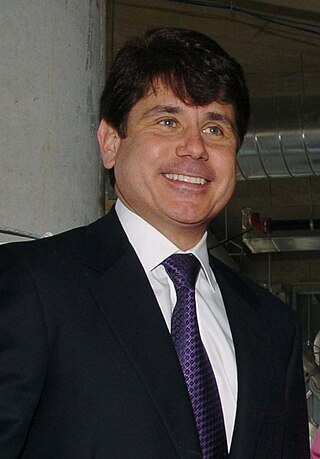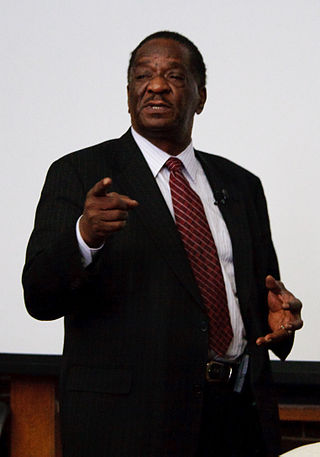
Rod Blagojevich, often referred to by his nickname "Blago" is an American politician of Serbian descent, political commentator, and convicted felon who served as the 40th governor of Illinois from 2003 to 2009. He was impeached, removed from office, convicted, and incarcerated for eight years on federal charges of public corruption. A member of the Democratic Party, Blagojevich previously worked in both the state and federal legislatures. He served as an Illinois state representative from 1993 to 1997, and the U.S. representative from Illinois's 5th district from 1997 to 2003.

The Illinois General Assembly is the legislature of the U.S. state of Illinois. It has two chambers, the Illinois House of Representatives and the Illinois Senate. The General Assembly was created by the first state constitution adopted in 1818. As of 2023, the current General Assembly is the 103rd.
Single-payer healthcare is a type of universal healthcare in which the costs of essential healthcare for all residents are covered by a single public system.
Families USA is a nonprofit, nonpartisan consumer health advocacy and policy organization.

Emil Jones Jr. is an American politician who was the President of the Illinois Senate from 2003 to 2009. A Democrat, Jones served in the Illinois Senate from 1983 to 2009, where he served as President of the Illinois Senate from 2003 to the end of his term. Previously, he was a member of the Illinois House of Representatives from 1973 until 1983.

Sara Feigenholtz is a Democratic member of the Illinois Senate who has represented the 6th District since 2020. The District includes the lakefront neighborhoods of Lake View, Lincoln Park, Buena Park and the Near North Side in the city of Chicago.
William Quincy Davis is a Democratic member of the Illinois House of Representatives, representing the 30th District since January 8, 2003. He is a member of the Illinois House Legislative Black Caucus.
Elga Lee Jefferies is an American politician who served as a Democratic Party member of the Illinois House of Representatives, representing the 26th District during the 95th Illinois General Assembly. Jeffries' appointment came following the death of the former Representative, Lovana "Lou" Jones; she then proceeded to be elected to her position in November 2006, but was later defeated in the 2008 primary election, finishing third out of five candidates.

The Campaign for Better Health Care(CBHC) is a coalition of healthcare advocates, labor unions, and nonprofit organizations working to bring a single-payer healthcare system to the United States. Based in Illinois, it was founded by Jim Duffet in 1989.

Heather Adeline Steans is a former Democratic member of the Illinois Senate, representing the 7th district. She was appointed after winning a special primary election that followed the mid-term resignation of her predecessor, Senator Carol Ronen. She resigned from office on January 19, 2021 after 12 years in office.
Healthcare reform in the United States has a long history. Reforms have often been proposed but have rarely been accomplished. In 2010, landmark reform was passed through two federal statutes: the Patient Protection and Affordable Care Act (PPACA), signed March 23, 2010, and the Health Care and Education Reconciliation Act of 2010, which amended the PPACA and became law on March 30, 2010.
A number of controversies related to Rod Blagojevich, formerly the Governor of Illinois, were covered in the press during and after his administration. In addition to a reputation for secrecy that was noted by the Associated Press, Blagojevich was the subject of political, legal, and personal controversies similar to those of his predecessor, Republican Governor George Ryan. To the surprise of many, Blagojevich said in 2008 that he agreed with the idea of commuting Ryan's federal prison sentence.
The history of health care reform in the United States has spanned many decades with health care reform having been the subject of political debate since the early part of the 20th century. Recent reforms remain an active political issue. Alternative reform proposals were offered by both of the major candidates in the 2008, 2016, and 2020 presidential elections.
The healthcare reform debate in the United States has been a political issue focusing upon increasing medical coverage, decreasing costs, insurance reform, and the philosophy of its provision, funding, and government involvement.
The public health insurance option, also known as the public insurance option or the public option, is a proposal to create a government-run health insurance agency that would compete with other private health insurance companies within the United States. The public option is not the same as publicly funded health care, but was proposed as an alternative health insurance plan offered by the government. The public option was initially proposed for the Patient Protection and Affordable Care Act, but was removed after independent Connecticut senator Joe Lieberman threatened a filibuster.

The Affordable Care Act (ACA), formally known as the Patient Protection and Affordable Care Act (PPACA) and colloquially known as Obamacare, is a landmark U.S. federal statute enacted by the 111th United States Congress and signed into law by President Barack Obama on March 23, 2010. Together with the Health Care and Education Reconciliation Act of 2010 amendment, it represents the U.S. healthcare system's most significant regulatory overhaul and expansion of coverage since the enactment of Medicare and Medicaid in 1965.

The 95th Illinois General Assembly, consisting of the Illinois Senate and the Illinois House of Representatives, existed from January 10, 2007 to January 13, 2009 during the final two years of Rod Blagojevich's governorship. The General Assembly met at Illinois State Capitol.
This article summarizes healthcare in California.

Lauren Ashley Underwood is an American politician and registered nurse who is a U.S. representative from Illinois's 14th congressional district as a member of the Democratic Party. Her district, once represented by former House Speaker Dennis Hastert, includes the outer western suburbs of Chicago, including Crystal Lake, Geneva, Oswego, Woodstock, and Yorkville.

The 93rd Illinois General Assembly, consisting of the Illinois Senate and the Illinois House of Representatives, existed from January 8, 2003 to January 11, 2005 during the first and second years of Rod Blagojevich's first term as governor of Illinois. The General Assembly met at the State Capitol.










